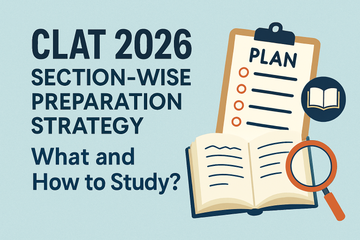The Common Law Admission Test (CLAT) is one of India’s most competitive entrance exams for aspiring law students, paving the way to premier institutions like National Law Universities (NLUs). With CLAT 2025 fast approaching, candidates must shift their preparation into high gear. But excelling in CLAT isn’t just about hard work –it’s about smart, section-wise preparation.
In this blog, we’ll break down the CLAT 2025 exam pattern, provide a section-wise strategy, and give you tips, resources, and methods to help you maximize your performance. Whether you’re a first-time test taker or aiming for a better rank this year, we are here to help you.
Understanding CLAT 2025: The Exam Pattern
Before diving into individual sections, let’s look at the structure of CLAT 2025:
|
Section |
Number of Questions |
Weightage |
|
English Language |
~22-26 |
20% |
|
Current Affairs (including General Knowledge) |
~28-32 |
25% |
|
Legal Reasoning |
~28-32 |
25% |
|
Logical Reasoning |
~22-26 |
20% |
|
Quantitative Techniques |
~10-14 |
10% |
|
Total |
120 Questions |
100% |
- Duration: 2 hours (120 minutes)
- Type: Multiple Choice Questions (MCQs)
- Marking Scheme: +1 for correct answer, -0.25 for incorrect answers
Section-Wise Strategy for CLAT 2025
1. English Language
What to Expect:
- Comprehension-based passages (~450 words each)
- Questions on vocabulary, inference, tone, main idea, etc.
Preparation Strategy:
- Read Daily: Newspapers like The Hindu, The Indian Express, or editorials from The Economist. Aim for at least 2 articles a day.
- Understand Context: Don’t memorise meanings—learn words in context.
- Practice RCs: Regularly solve comprehension passages. Focus on time management and accuracy.
- Grammar & Usage: CLAT doesn’t directly ask grammar rules, but understanding structure improves comprehension.
Recommended Books/Resources:
- Word Power Made Easy by Norman Lewis
- CLAT practice mocks and previous year papers
Key Tips:
- Focus on tone-based questions (sarcastic, persuasive, objective, etc.)
- Highlight keywords while reading passages
- Learn to eliminate options wisely
2. Current Affairs (Including GK)
What to Expect:
- Passage-based questions on recent events (national and international)
- Focus on legal, political, economic, and technological developments
Preparation Strategy:
- Read Newspapers Daily: Prioritize The Hindu, Indian Express, and LiveMint for current affairs.
- Make Short Notes: Maintain a monthly current affairs journal.
- Focus Areas: Awards, government schemes, international relations, court rulings, environment, sports, etc.
- Link Events to Law: E.g., protests and related constitutional rights.
Recommended Books/Resources:
- GKP's CLAT Monthly Current Affairs Collection
- Lucent's GK (for static topics)
- Pratiyogita Darpan (selectively)
Key Tips:
- Focus more on last 6-8 months of current events before the exam
- Don’t skip legal developments and Supreme Court judgments
- Practice mock questions with passage-based formats
3. Legal Reasoning
What to Expect:
- Passages (~450 words) on legal matters, public policy, and moral philosophy
- Questions test ability to infer legal principles and apply them to hypothetical scenarios
Preparation Strategy:
- Read Law-Based Content: Follow legal news from Bar & Bench, LiveLaw, and The Hindu Legal Section.
- Understand Legal Concepts: Constitution, IPC, tort law, contracts, fundamental rights, etc.
- Practice Application: Learn how to apply a legal principle to a fact-based question.
- Don’t Assume Facts: Use only the principle given in the passage.
Recommended Books/Resources:
- GKP’s Legal Aptitude Guide for CLAT
- CLAT Legal Reasoning Previous Year Papers
Key Tips:
- Read carefully; don’t get emotionally influenced
- Practice “principle-fact” type questions daily
- Focus on identifying relevant vs. irrelevant information
4. Logical Reasoning
What to Expect:
- Short passages (~300 words) followed by reasoning questions
- Argument analysis, strengthening/weakening arguments, conclusions, assumptions, analogies
Preparation Strategy:
- Practice Daily: Focus on critical reasoning and passage-based questions.
- Types of Questions: Cause-effect, paradox, statement-assumption, etc.
- Focus on Logic Flow: Identify premises and conclusions.
- Work on Speed: Time yourself while solving reasoning sets.
Recommended Books/Resources:
- CLAT | LLB 2026 : Law Entrance Study Guide by Priya Jain
- GMAT Critical Reasoning (for advanced practice)
Key Tips:
- Don’t rush—understand the structure of the argument
- Eliminate extreme or irrelevant answer choices
- Practice previous years’ passage-based reasoning sets
5. Quantitative Techniques
What to Expect:
- Data interpretation-based short sets
- Questions require applying basic math (Class 8–10 level)
Preparation Strategy:
- Revise Basic Maths: Percentages, Ratios, Time & Work, Profit-Loss, SI-CI, Averages, Graphs, Tables
- Interpret Data: Most questions are graph/table-based—practice interpreting information quickly
- Solve Daily: Set aside 30 minutes every day for quant practice
Recommended Books/Resources:
- CLAT | AILET 2026 : Chapter-wise Solved Papers 2008-2025 By Gautam Puri
- CLAT Foundation Maths Workbooks
Key Tips:
- Accuracy matters more than speed here
- Learn shortcuts and formulas by heart
- Keep a formula sheet for revision
General Tips to Ace CLAT 2025
Start with Mock Tests
- Take 1-2 mocks every week starting immediately
- Analyze your performance thoroughly and identify weak areas
Build a Weekly Plan
- Dedicate time to all 5 sections
- Include reading time, practice sessions, and mock analysis
Revision is Crucial
- Revise your notes weekly—especially for current affairs and legal terms
Work on Time Management
- Learn to skip questions that take longer than 90 seconds
- Practice completing full-length papers in 120 minutes
How to Deal with CLAT Stress and Stay Consistent?
- Mindset: Remember, CLAT is a test of patience and consistency, not just intelligence
- Routine: Stick to a fixed schedule. Avoid burnout by taking short breaks.
- Peers & Mentors: Discuss doubts with fellow aspirants or join online communities
- Stay Updated: Follow official updates on consortiumofnlus.ac.in
Why Section-Wise Strategy Works?
CLAT is not just about knowledge—it’s about applying that knowledge strategically across sections. A well-thought-out plan that treats each section with equal importance and tailors preparation accordingly will always outperform a generic study method.
Conclusion: Your Road to NLUs Starts Here
CLAT 2025 is your gateway to some of the most prestigious law schools in India. By understanding what each section demands and preparing smartly with the right resources and techniques, you can significantly improve your chances of success. Focus on consistent practice, regular reading, and test analysis. Remember, every section has the power to boost or break your rank, so prepare accordingly.
And finally, stay motivated and believe in your ability. The NLUs are waiting for you—go claim your seat!
Explore CLAT 2025 Study Material by GK Publications
GK Publications offers a wide range of expertly curated books for CLAT preparation:
- CLAT 2026: Topic-wise Practice Sets | Includes 2 Mock Test & (CLAT | AILET) Solved Papers (2021 to 2025) by Gautam Puri
- CLAT 2026: Legal Aptitude Study Guide | Includes Practice Paper & Complete Solved Paper of CLAT 2025 Exam
- CLAT | LLB 2026: Law Entrance Study Guide by Priya Jain
- CLAT | AILET 2026: Chapter-wise Solved Papers 2008-2025 By Gautam Puri








8zqwph
kfsbek
kfsbek